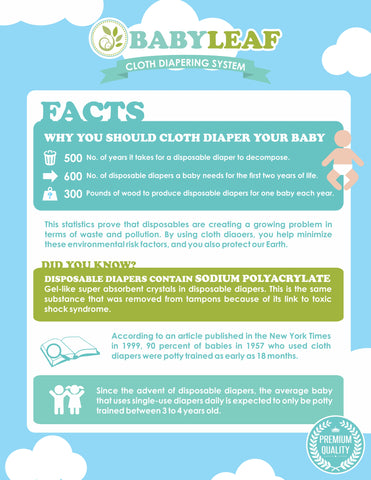5 Reasons to Use One-Size Cloth Diapers

We've got even more reasons for you to use cloth diapers for your baby! Have you ever considered making the switch?
1. It's better for your baby's health.
Baby Leaf One-Size Cloth Diapers are completely safe for your baby, unlike many conventional disposable diapers which use sodium polyacrylate to absorb moisture. This chemical substance is found in nearly all single-use diapers, and has even been observed to leave a residue on baby's genitals after a diaper change. According to the National Association of Cloth Diapers (U.S.A) dioxin, a by-product of the paper-bleaching process, poses another risk factor among wearers of disposables. This was the same chemical by-product found in a variety of toiletries, which has been linked to cancer, birth defects, liver damage, and skin diseases. With Baby Leaf One-Size Cloth Diapers, you can be sure none of these harmful chemicals will ever touch your baby's delicate skin.
2. It's environmentally-friendly.
It's no mystery that disposable diapers are an environmental risk. Just check out these statistics:
In 1988, over 18 billion diapers were sold and consumed in the United States that year.4 Based on our calculations (listed below under "Cost: National Costs"), we estimate that 27.4 billion disposable diapers are consumed every year in the U.S.1
The instructions on a disposable diaper package advice that all fecal matter should be deposited in the toilet before discarding, yet less than one half of one percent of all waste from single-use diapers goes into the sewage system. Over 92% of all single-use diapers end up in a landfill.
No one knows how long it takes for a disposable diaper to decompose, but it is estimated to be about 250-500 years, long after your children, grandchildren and great, great, great grandchildren will be gone.
These statistics prove that disposables are creating a growing problem in terms of waste and pollution. By using cloth diapers such as Baby Leaf's One-Size Cloth Diapers, you help minimize these environmental risk factors, and you also protect our Earth.
3. It'll be easier to potty train your baby.
According to an article published in the New York Times in 1999, 90 percent of babies in 1957 who used cloth diapers were potty trained as early as 18 months. Since the advent of disposable diapers, the average baby that uses single-use diapers daily is expected to only be potty-trained between his 36th to 42nd month. That's your average 3 to 4 year old! This is mainly due to the fact that disposable diapers “exempts” a baby or child wearing it from the feeling of discomfort after he urinates.
When you use cloth diapers, such as Baby Leaf's One Size Cloth Diapers, your baby feels the wetness whenever he pees or poops. This is actually beneficial for potty-training, since your baby will learn to communicate his discomfort and promote his toilet training habit. This is why cloth diapering encourages your child to develop an increased sense of communication and self-awareness, which is essential to his development.
4. Cloth-diapering actually is convenient, unlike many choose to believe.
Modern cloth diaper makers have considered how multinational producers of disposables have marketed single-use diapers, and have learned how to combine the convenience of using disposables with the eco-friendliness of using cloth. Today, cloth diapers no longer need to be folded, ironed and pinned. You can get cloth diapers with disposable inserts, washable covers, Velcro straps or snaps, organic cloth diapers, and other options.
With Baby Leaf One Size Cloth diapers, for example, you get a cost-effective, one-size diaper made of child-friendly materials that grows with your baby, and comes in a variety of styles and colors. Snap buttons adjust the sizing to fit small, medium and large babies, while providing a snug and comfortable custom fit. It's got a waterproof, outer layer that prevents leaking, an inner layer of custom micro fleece that keeps baby dry, and a pocket insert function.
5. It's more cost-effective in the long run.
While it's true that you will spend a large amount when you get your first bulk supply of cloth diapers, the overall cost-effectiveness of cloth diapers far outweigh what you'll end up spending on disposables. First of all, the Baby Leaf One Size Cloth diapers are more economical because it enables you to adjust the diapers’ size as your baby grows – no need to buy another batch of diapers when your baby shoots up after a growth spurt. Secondly, cloth diapers – as we previously mentioned – encourage early potty training. This means that your baby will be in diapers for less time, which translates to more savings. Thirdly, you'll save on waste production and spending on non-biodegradable disposables, because you can include your cloth diapers in your regular wash loads.
RESOURCES
- http://www.diapernet.org/whycloth.htm, EPA, "Integrated Risk Assessment for Dioxins and Furans from Chlorine Bleaching in Pulp and Paper Mills."
- Armstrong, Liz and Adrienne Scott Whitewash: Exposing the Health and Environmental Dangers of Women's Sanitary Products and Disposable Diapers, What You Can Do About It. 1993. HarperCollins.
- Lehrburger, Carl. 1988. Diapers in the Waste Stream: A review of waste management and public policy issues. 1988. Sheffield, MA: self-published.
- Link, Ann. Disposable nappies: a case study in waste prevention. April 2003. Women's Environmental Network
- The New York Times, January 12, 1999; The Wall Street Journal, May 4, 1993
- http://www.tideedidee.com/
